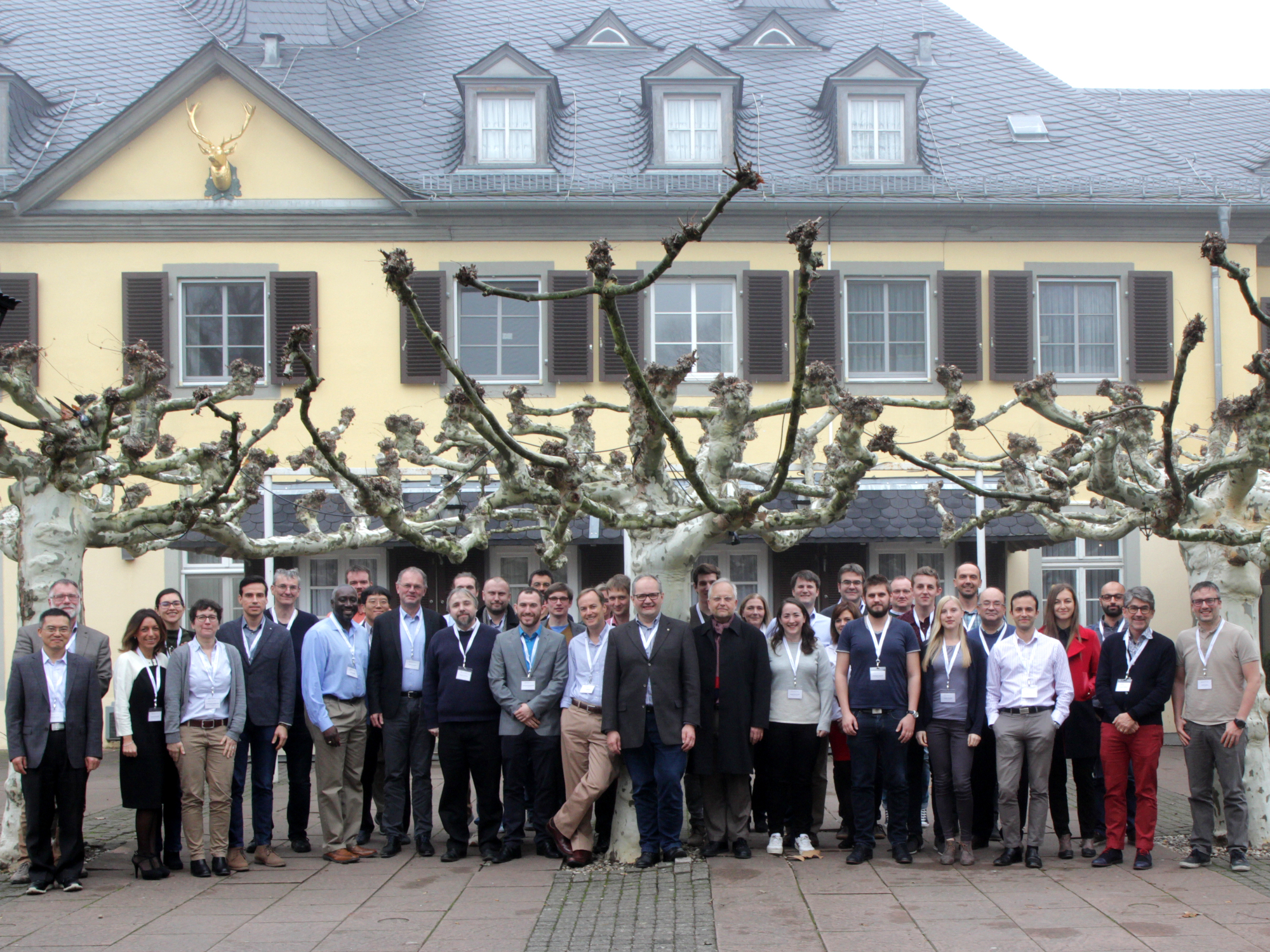The Beilstein Organic Chemistry Symposium “Mechanochemistry: Microscopic and Macroscopic Aspects”, took place from November 13th to 15th, 2018 at the Jagdschloss Hotel in Rüdesheim, Germany. In this magical venue, over forty worldwide experts on the field of mechanochemistry gathered together to disrupt the silence and calmness of this beautiful site with their mechanical energy. Put into numbers, this symposium consisted of twenty-two lectures given by international invited speakers, together with eighteen poster presentations showing recent breakthroughs in mechanochemistry.
On the first day, Dr. Martin G. Hicks opened the symposium by sharing the vision and philosophy of the Beilstein-Institut and by highlighting the appropriateness of open science in current times. Next, Dr. José G. Hernández (RWTH Aachen University) introduced the scientific program of the symposium emphasizing the importance of bringing together leading experts under one roof to understand the broadness and richness of mechanochemistry. Indeed, during the first scientific session of the symposium Prof. Stuart L. James (Queen’s University Belfast) showed the wideness of mechanochemistry, the sustainability aspects of mechanochemical reactions and the opportunities for commercialization of mechanochemically made products. Then, an energetic presentation by Prof. Tomislav Friščić (McGill University) delved into the thermodynamics aspects of mechanochemical reactions and the advantages of in situ monitoring of ball milling transformations. After a vivid coffee break, Prof. Stephen Craig (Duke University) introduced the microscopic aspects of mechanochemistry by showing the usefulness of introducing force-reactive functional moieties (mechanophores) in polymers to develop mechanically responsive materials and devices. Complementary, Prof. Martin K. Beyer (University of Innsbruck) demonstrated how single-molecule force spectroscopic techniques enable the transduction of mechanical forces with high directionality and the possibility to measure the mechanical loads required to mechanochemically rupturing covalent bonds.
The Tuesday’s afternoon session began with a presentation by Prof. Frédéric Lamaty (University of Montpellier), who showed the importance of ball milling techniques to develop mechanochemical organic and organometallic syntheses, with implications in chemistry and biology. Then, Dr. Joseph S. Vyle (Queen’s University Belfast) took all the attendees through a journey from the early days to the present to highlight the vital role of mechanochemistry in developing nucleic acid chemistry. The second part of the afternoon was dedicated to presentations focused on synthetic organic mechanochemistry by Prof. Guan-Wu Wang (University of Science and Technology of China) and Prof. José Carlos Menendez (Complutense University of Madrid), who demonstrated the power of mechanochemistry to build supramolecular assemblies and to develop diversity-oriented synthesis based on multicomponent reactions, respectively.
After an entertaining first day of oral presentations, the symposium was complemented by the first of two excellent poster sessions, which provided additional opportunities for interaction and scientific discussion between all participants.
The second day of the meeting began with a comprehensive talk by Prof. Carsten Bolm (RWTH Aachen University) describing the advantages of mechanochemistry in the field of catalysis. Specifically, a palette of solvent-free metal-catalyzed C–H functionalizations were presented. The morning session continued with an enjoyable lecture by Prof. James Mack (University of Cincinnati) entitled “Developing Selective Reactions under Mechanochemical Conditions”, in which the importance of milling parameters (e.g., frequency) and temperature control for the outcome of mechanochemical reactions were discussed. Next, Prof. Dominik Marx (Ruhr University Bochum) brought along his expertise on computational chemistry to provide a molecular understanding of the mechanochemical cycloreversion of triazoles in the context of covalent mechanochemistry. The final talk of the Wednesday’s morning session was given by Prof. Sergi Garcia-Manyes (King’s College London), who covered the microscopic aspects of mechanochemistry by using single-molecule force clamp spectroscopy. Particularly interesting were the findings that showed how tensile forces could change the free-energy surface of chemical transformations, leading to the formation of otherwise thermodynamically unfavored products.


